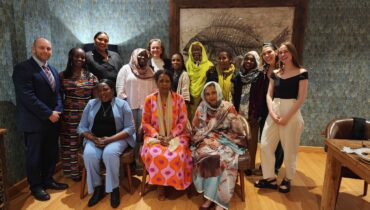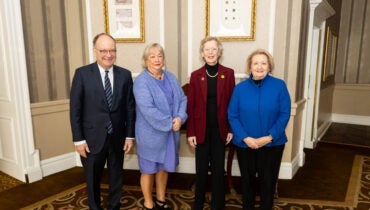May Sabe Phyu, or Phyu Phyu as she is affectionately known, is a devoted advocate for women’s empowerment and peacebuilding in Myanmar.
She is a Director for the Gender Equality Network in Myanmar. In this role, Phyu Phyu facilitates dialogue between civil society, government stakeholders and parliamentarians through meetings and workshops on gender equality as a means of shifting policy.
When asked how she became an activist, Phyu Phyu said, “It’s a good question! I started my career as a humanitarian worker, a social worker.” She worked to provide care and support for people living with HIV/AIDS for more than 10 years. She states that before she considered herself an activist, she was “just an ordinary mother and housewife doing social work serving [her] own community.”
She cites watching the documentary film “Pray the Devil Back to Hell” as being a transformational experience. “This really made me change – it made me think and reflect on our situation for women [in Myanmar]. It made me want to work on women, peace and security issues.”
Phyu Phyu co-founded the Kachin Peace Network and the Kachin Women Peace Network to work toward inter-ethnic cooperation. She has worked to prioritize the needs of women through these networks, specifically focusing on security and protection issues, while advocating for greater inclusion of women in peace processes in Myanmar.
She states “the topic of gender was very sensitive in our country before.” But due to the progress made in the country and the efforts of the Gender Equality Network and others, groups working on issues related to gender are able to do so with less stigma. This allows the Network to advocate for policies in support of women’s rights.
For Phyu Phyu, making a difference in her own community was a key motivation for becoming an activist. “What made me become an activist was [wanting to] reduce conflict in Kachin State.” She notes that before she got involved, she thought of politics as dirty. “Politics seemed like a man’s game – like it has nothing to do with us women. But politics itself is not dirty at all. It is because of the people who are involved in the politics – they make politics seem dirty.”
As she got more involved, she realized that “outside of Yangon, they don’t have any idea what’s really happening in Kachin state.” She wanted to play a role in working to raise awareness about the needs of women and girls and the people of Kachin state, “otherwise our people will suffer violently.”
Phyu Phyu played an essential role in developing the country’s National Strategic Plan for the Advancement of Women. She says that prior to working on the Strategic Plan, there was no trust built between the civil society groups and the government. “Developing the National Strategic Plan was a starting point for seeing how we can work together.” They are now working to draft Myanmar’s first law on violence against women. “It will be the first law protecting women from different kinds of violence in our country. It will be a kind of model process for how government can involve civil society.”
Phyu Phyu shares that the process has not been quite so seamless for the Kachin Peace Network. “Because of the long conflict in Kachin State and the long suffering of the Kachin people, trust has been broken. There’s a lot of inter-ethnic tension for the Burmese people.”
An important piece of this work to build trust has been documenting the advocacy that is taking place. “We brought a lot of media with us for this peace advocacy trips so that the media can record and document the real situation on the ground.”
Phyu Phyu has also been working to advocate for the rights of internally displaced persons (IDPs) in Myanmar. She says, “nearly half of the IDPs are in government-controlled areas and 50 percent are living under Kachin ethnic arms groups controlled areas. The difficulties and living conditions of those two areas are quite different.” She also noted the challenges for IDPs along the China border. She states, “the camps along the China border are not government-controlled, and there’s very little humanitarian assistance from the international community…they are running with very limited resources.”
The Kachin Women Peace Network worked with the Gender Equality Network to conduct an assessment of 17 camps and the specific needs of women living in those camps. “There are a lot of issues that are not addressed and are not getting any attention from humanitarian actors. Women have to live in tents with no privacy. Violence happens in the camps with no reporting mechanism. And there is no separated latrine or water source. There are a lot of women-specific issues there.”
Phyu Phyu has also been an advocate against the Interfaith Marriage Bill in Myanmar, which would impose restrictions on inter-faith marriages. If passed, the bill would require Buddhist women to seek permission from authorities before marrying outside their faith. “A few women leaders released the very first statement against the Interfaith Marriage Bill. We gather frequently and discuss how to address it before we submit it to the parliament.” She and other women’s rights activists have been vocal in their opposition of the bill because it limits women’s rights to make decisions.
The leaders of the 97 women’s and civil society groups who released a statement opposing this bill started receiving death threats and sexual harassment threats as a result of their advocacy. Despite these threats, 166 civil society groups have joined the coalition. Phyu Phyu also helped to organize a variety of workshops outlining reasons for opposing the Interfaith Marriage Bill, and these workshops included groups like the UN and international nongovernmental organizations.
She stresses the importance of including these groups, noting, “Without the international community’s support, we are under threat…we do not have any protection.” She also acknowledges the need to include the media in these workshops and in the movement. She credits the movement with positive outcomes for this Bill. “We strongly believe that, because of our movement and our mobilization…we may delay the process of the Interfaith Marriage Bill.”
In September 2012, Phyu Phyu was charged during a peaceful demonstration calling for an end to civil war in Myanmar. Over the 14 months that followed those charges, she and her fellow co-organizer made 124 appearances in six courts before their charges were dismissed under presidential amnesty. She says, “being charged in six different courts for peaceful demonstration has made us real activists.”
For Phyu Phyu, women’s rights and peace in Myanmar are intertwined. When asked how she defines peace and security, Phyu Phyu says, “To me, peace is equality and justice. If there is no equality and justice, there will not be peace. When I say equality, it’s across everything – it’s across women and men, it’s ethnic and religious differences, it’s across nationality – if we are able to live equally in our society with fairness and justice, this is what we call a peaceful society.”


